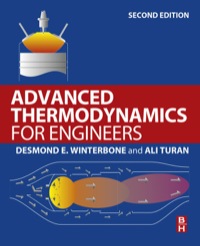Air enters the compressor of a simple gas turbine at a pressure of (1 mathrm{bar}) and a
Question:
Air enters the compressor of a simple gas turbine at a pressure of \(1 \mathrm{bar}\) and a temperature of \(25{ }^{\circ} \mathrm{C}\). The compressor has a pressure ratio of 15 , and an isentropic efficiency of \(85 \%\), and delivers air to a combustion chamber which is supplied with methane \(\left(\mathrm{CH}_{4}\right)\) at \(25^{\circ} \mathrm{C}\). The products of combustion leave the chamber at \(1450 \mathrm{~K}\) and suffer a pressure loss of \(5 \%\) in passing through it. They are then expanded in a turbine with an isentropic efficiency of \(90 \%\) to a pressure of 1.05 bar. Calculate
(a) the air-fuel ratio of the engine,
(b) the power output per unit mass flow of air and
(c) the rational efficiency of the engine. What is the maximum work per unit mass of exhaust gas that could be obtained if the ambient conditions are 1 bar and \(25^{\circ} \mathrm{C}\) ?
The enthalpy of reaction based on \(25^{\circ} \mathrm{C}\) is \(-50,000 \mathrm{~kJ} / \mathrm{kg}\) and the Gibbs energy of reaction is \(-51,000 \mathrm{~kJ} / \mathrm{kg}\). The products of combustion can be treated as a perfect gas with \(c_{p}=1.2 \mathrm{~kJ} /\) \(\operatorname{kg~K}\) and \(\kappa=1.35\).
\([0.02 ; 372.9 \mathrm{~kJ} / \mathrm{kg} ; 36.6 \% ; 260.4 \mathrm{~kJ} / \mathrm{kg}]\)
Step by Step Answer:

Advanced Thermodynamics For Engineers
ISBN: 9780080999838
2nd Edition
Authors: D. E. Winterbone, Ali Turan





